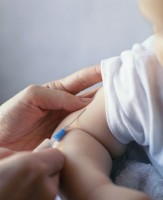Καμία σύνδεση δεν βρέθηκε μεταξύ του υδραργύρου που βρίσκεται στα εμβόλια και του αυτισμού
 No link found between vaccine mercury and autism
No link found between vaccine mercury and autismNEW YORK– A new government study adds to the evidence that thimerosal, a mercury-based preservative until recently found in many vaccines, does not increase children's risk of autism.
It shows kids who had been exposed as babies to high levels of the preservative -- through vaccines they received or their mothers received while pregnant -- were no more likely to develop autism, including two distinct subtypes of the condition.
"This study should reassure parents about following the recommended immunization schedule," said Dr. Frank Destefano, director of the Immunization Safety Office at the Centers for Disease Control and Prevention (CDC) in Atlanta, and the study's senior author.
Concerns about a link between vaccines and autism were first raised more than a decade ago by British physician Andrew Wakefield.
His report, based on 12 children, has since been discredited and was retracted earlier this year by the journal that published it. In the meantime, it sparked a fierce worldwide debate among scientists and a health scare that caused many parents to shy away from recommended vaccines like the one against measles, mumps and rubella.
Outbreaks of all three diseases followed.
One widespread worry has been that thimerosal might play a role in the development of autism, a condition that affects as many as one in 110 U.S. children, according to the CDC.
Most scientists consider autism a developmental disorder, likely influenced by genes.
Autism spectrum disorders range from mild Asperger's Syndrome to severe mental retardation and social disability, and there is no cure or good treatment.
The CDC researchers used data for U.S. children born between 1994 and 1999, who were enrolled in one of three managed care organizations.
They found 256 children with an autism spectrum disorder and compared them with 752 children who did not have the condition, but were matched for age and sex.
No matter when a child had been exposed to thimerosal -- before birth when the mother had a shot, or when the child itself was vaccinated as a baby or toddler -- there was no increase in the risk of any type of autism spectrum disorder.
In fact, those kids who were exposed to the preservative between birth and 20 months of age had slightly lower odds of developing the condition, although the researchers could not explain that result.
"This is a very reassuring study," said Dr. Michael J. Smith, a pediatrician at the University of Louisville School of Medicine in Kentucky who was not involved in the research.
"These data show that you could receive a thimerosal vaccine and not be concerned about it."
Smith, who said he has a fully vaccinated two-month-old at home, noted that autism rates have continued to rise, although thimerosal has been removed from all routine childhood vaccines, except flu shots.
For parents who remain concerned about thimerosal in the flu shots, he said there are alternatives without the preservative, such as FluMist, a nasal spray that can be used in children aged two and older.
Some parents have also worried that giving too many shots at once, or in children who are too young, could cause mental problems. Smith said studies had dispelled those concerns one by one.
"There is no credible evidence" for a link between vaccines and autism, he told Reuters Health.
By Frederik Joelving Frederik Joelving – Mon Sep 13, 3:38 am ET
Πηγή Reuters
Correspondent “eumedline.eu” Agoritsa BAKA, MD




















